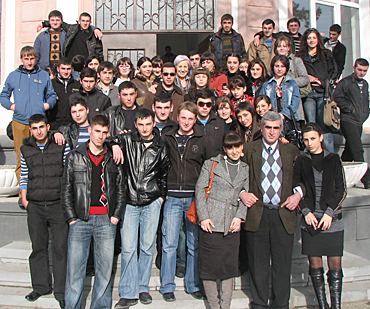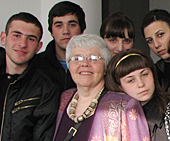ISU efforts to create community colleges in Georgian Republic threatened by violence
08-14-08
Click on picture below for print quality version.

Students and faculty stand outside the new community college created in Gori, the Georgian Republic, by a collaborative led by an Iowa State emeritus professor. Dr. Lali Gogeliani, director of the community college program from Georgia who visited ISU last week, is in the top center of the picture, near the doorway. Photo by Joe Monahan
Contacts:
Ardith Maney, Political Science, (414) 324-0581, (414) 763-9270, amaney@iastate.edu
Mike Ferlazzo, News Service, (515) 294-8986, ferlazzo@iastate.edu
ISU efforts to create community colleges in Georgian Republic threatened by violence
AMES, Iowa -- When the Russian military attacked the Georgian Republic last week, it may have been a continent away, but it hit pretty close to home at Iowa State University. That's because an ISU emeritus professor has been spearheading a collaborative effort to set up a network of community colleges in Georgia.
Ardith Maney, an emeritus professor of political science, has directed ISU's programs in Georgia since 2002. Under her leadership, officials from ISU, Kirkwood Community College, Muscatine (Iowa) Community College, Moraine Valley (Ill.) Community College and Waukesha County (Wis.) Technical College worked together to establish a new community college in Gori. The Georgian city is 20 miles away from the country's border with South Ossetia, a region where Russian infantry units and armored personnel carriers have inflicted widespread damage.
"We don't know yet what's happened to the (Gori Community College) building during the attacks," said Maney, who retired from ISU this spring and is now a consultant for Community Colleges for International Development (CCID), based in Cedar Rapids.
"We know that among the students who took classes there in the spring, the male students went into (military) reserve training in the summer," she said. "We don't know the role they played in the activities of the last week. I'm sure all students and their families are scattered all over the place. There are 45 teachers and administrators at the school and we also don't know the current situation for them."
New college first of seven planned
The new college in Gori was the first of seven community college programs the group planned to establish in Georgia -- including sites in Tblisi, the Georgian capital; and Batumi, the main vacation area along the Black Sea. Maney says her collaborative group has trained teachers and brought textbooks and programming to the other sites, but Gori is the only school that taught students thus far.
"We get syllabi and other curriculum materials -- software, etc. -- from the community college partners, and then the Georgian experts in those fields develop the course materials and textbooks in the Georgian language," Maney said.
She says that the director of the community college program from Georgia, Dr. Lali Gogeliani, and Konstantine Maghradze, a staffer in the CCID center in Tbilisi, were visiting Iowa State last week to meet with faculty and staff and visit additional community colleges in the region. After news of the attack broke, Gogeliani, Maghradze and Giorgi Chighladze, an ISU graduate student in agricultural and biosystems engineering who is from Georgia, were able to communicate with their families via phone and the Internet. ISU officials also helped Gogeliani and Maghradze fly home via Armenia, where her family picked them up and drove them back to Tbilisi. They are now assessing how the program can assist in Gori's renewal after the Russian forces withdraw.
Maney's work at ISU included outreach efforts with community colleges and international countries for the past 15 years. She last visited Georgia in March. Two other ISU colleagues -- Steve Mickelson, an associate professor of agricultural and biosystems engineering and director of the Center for Teaching Excellence; and Joe Monahan, a program coordinator in engineering distance education -- were there in May. Over the last four years, 12 members of the ISU faculty and staff have visited Georgia to assist with the community college project.
Half a million dollars in funding
The project has received more than $500,000 in funding from the U.S. and Canadian governments, NATO, Canadian community college partner Selkirk College in British Columbia, and additional foundations.
That project is now on hold because of the recent violence, which Maney says may have come about because of a Russian plot to lure the Georgian government into attacking South Ossetian territory. South Ossetia and Abkhazia never accepted being part of Georgia after the collapse of the former Soviet Union and fought to win their independence in the civil wars fought on Georgian territory in the 1990s.
"I think Russia laid a trap by getting the South Ossetians to fire on the Georgians, and getting the Georgians to fire back -- and that is the spark that started this off," she said. "I think the Russians were ready for this because they moved so many tanks through the mountainous passes so quickly and used such overwhelming force to push the Georgians not only out of those two regions (Ossetia and Obkhazia), but also to chase them into Gori and other parts of Georgia proper.
"My hope is that the European Union, the U.S., Russia and Georgia can come to a deal that recognizes that Georgia has lost control of those two areas," she said. "I think many Georgians are willing to pay that price. But in return, the Russians have to accept European monitors -- like French, Ukrainian and Polish -- to make sure there are no Russian military forces inside of South Ossetia and Abkhazia and no incursions inside Georgia. Essentially, the Russians need to agree with Georgia's independence and whatever the other conditions of that agreement might be."
Additional information on the Georgia Connection project is available at: http://www.georgiaconnection.net/.
-30-
